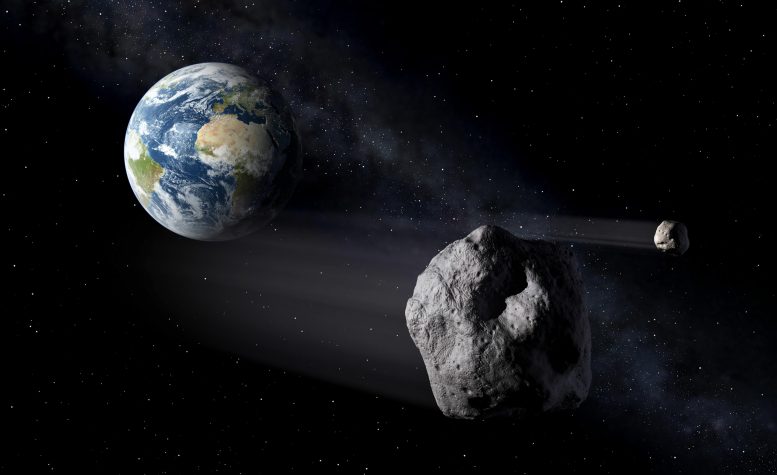
This week, two significant asteroids, including the newly discovered 2024 MK, will safely pass Earth in a coincidence that aligns with Asteroid Day. Credit: ESA – P.Carril.
Two asteroids, including the newly detected 2024 MK, will pass Earth safely this week, coinciding with Asteroid Day. The event highlights efforts such as the European Space Agency’s asteroid deflection mission and their new Flyeye telescope system aimed at improving our detection and response to these celestial threats.
Two large asteroids will safely pass Earth this week, a rare occurrence perfectly timed to commemorate this year’s Asteroid Day. Neither poses any risk to our planet, but one of them was only discovered a week ago, highlighting the need to continue improving our ability to detect potentially hazardous objects in our cosmic neighborhood.
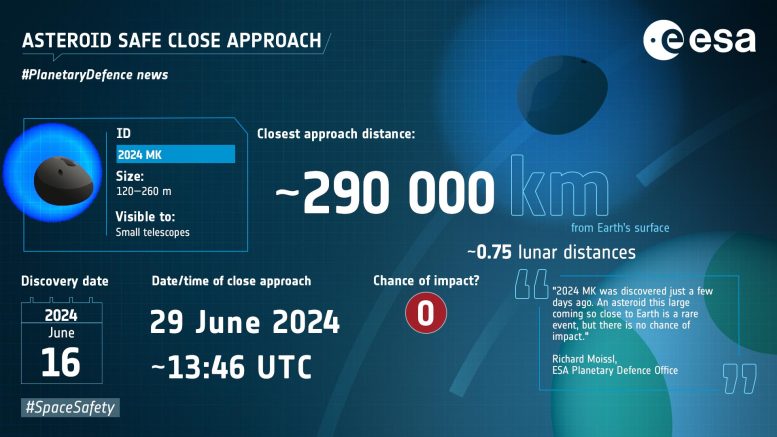
Asteroid 2024 MK will fly past Earth on June 29 at approximately 13:45 UTC (15:45 CEST). It is between 120 and 260 m across and will pass within the orbit of the Moon. Credit: ESA
2024 MK – Less Than Two Weeks Between Discovery and Flyby
Asteroid 2024 MK is between 120 and 260 m (400 to 850 feet) in size and was discovered on June 16, 2024. The asteroid will fly past Earth on June 29 during the height of this year’s Asteroid Day activities.
2024 MK is large for a near-Earth object (NEO) and will pass within 290,000 km (180,000 miles) of Earth’s surface – roughly 75% of the distance between Earth and the Moon.
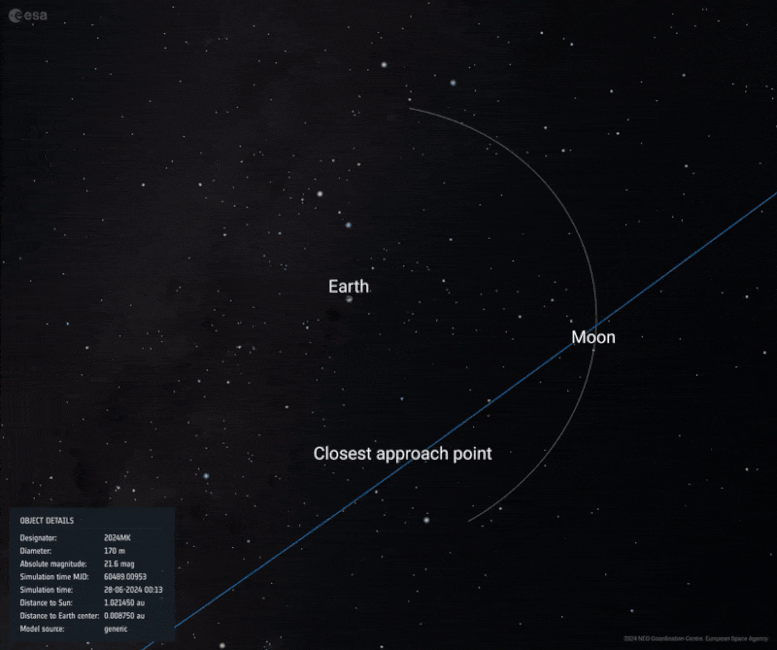
Asteroid 2024 MK will fly past Earth on June 29 at approximately 13:45 UTC (15:45 CEST). It is between 120 and 270 m across and will pass within the orbit of the Moon. The asteroid was discovered on June 16, 2024, only 13 days before it passes Earth. It poses no risk to our planet, but the fact that it was discovered so late highlights the need to continue improving our ability to detect potentially hazardous object in our cosmic neighborhood. Credit: ESA
There is no risk of 2024 MK impacting Earth. However, an asteroid this size would cause considerable damage if it did, so its discovery just one week before it flies past our planet highlights the ongoing need to improve our ability to detect and monitor potentially hazardous near-Earth objects (NEOs).
Due to its size and proximity, 2024 MK will be observable in clear dark skies on June 29 using a small telescope for amateur astronomers in some parts of the world. Plan your observations using ESA’s NEO toolkit.
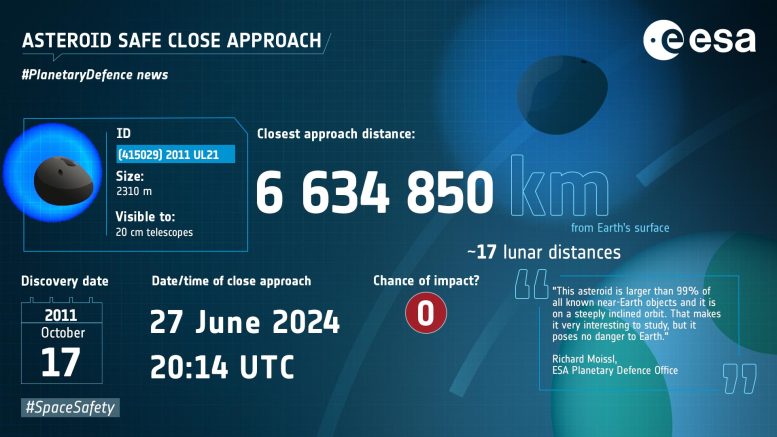
Asteroid (415029) 2011 UL21 will fly past Earth on June 27, at 20:14 UTC (22:14 CEST). At 2310 m across, it is larger than 99% of all known near-Earth objects (NEOs), but it poses no risk to Earth and will pass by more than 17 times as far away as the Moon. Credit: ESA
(415029) 2011 UL21 – Larger Than 99% of Near-Earth Asteroids
Asteroid (415029) 2011 UL21 is the larger of the week’s visitors. At 2310 m (7600 feet) across, this asteroid is larger than 99% of all known near-Earth objects. However, it won’t come anywhere near as close to Earth. At its closest point on June 27, it will still be more than 17 times as far away as the Moon.
This asteroid’s orbit around the Sun is steeply inclined, which is unusual for such a large object. Most large objects in the Solar System, including planets and asteroids, orbit the Sun in or close to the equatorial plane.
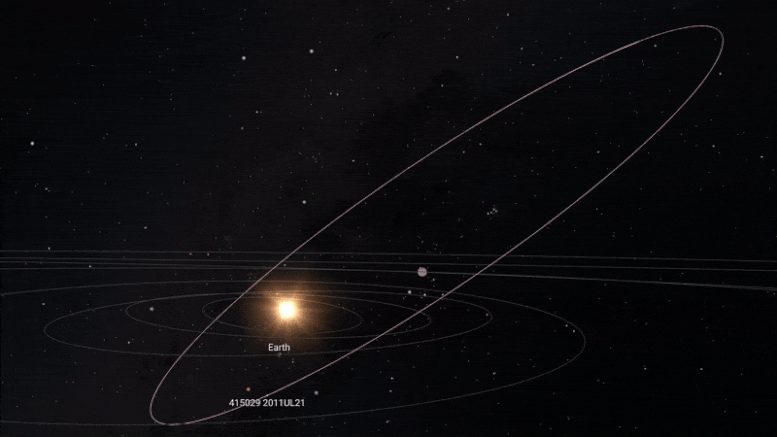
Asteroid (415029) 2011 UL21 will fly past Earth on June 27, at 20:14 UTC (22:14 CEST). At 2310 m across, it is larger than 99% of all known near-Earth objects (NEOs), but it poses no risk to Earth and will pass by more than 17 times as far away as the Moon. Credit: ESA
This could be the result of gravitational interactions with a large planet like Jupiter. Jupiter can deflect previously safe asteroids inwards toward Earth, so understanding this process is important.
(415029) 2011 UL21 is in an ‘11:34 resonance’ with Earth. It completes 11 orbits around the Sun in almost the exact same amount of time in which Earth completes 34 orbits (i.e. 34 years).
The result is a pleasant repeating pattern when you visualize the asteroid’s location relative to Earth over a period of 34 years while keeping Earth fixed in place.
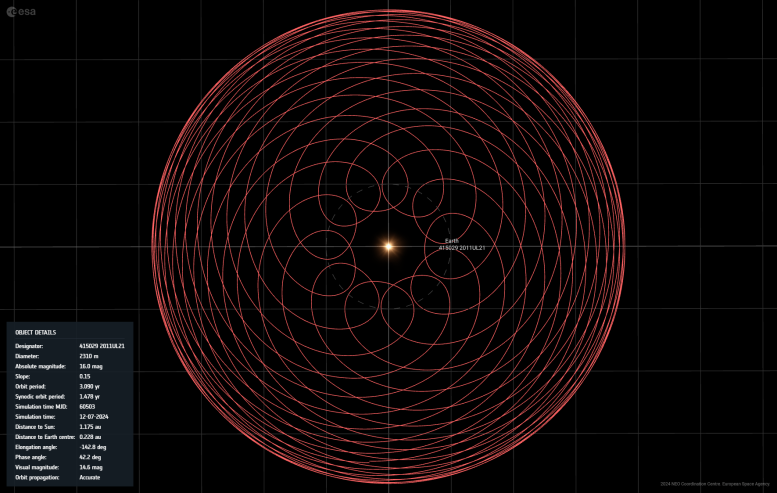
Asteroid (415029) 2011 UL21 will pass Earth on June 27. At 2310 m across, this asteroid is larger than 99% of all known near-Earth objects (NEOs). At its closest point, it will still be more than 17 times as far away as the Moon.
(415029) 2011 UL21 is in an ‘11:34 resonance’ with Earth. It completes 11 revolutions about the Sun in almost the exact same amount of time in which Earth completes 34 revolutions (i.e. 34 years).
The result is a pleasant repeating pattern when you visualize the asteroid’s location relative to Earth over a period of 34 years while keeping Earth fixed in place using a ‘Synodic Orbit Visualisation Tool’. Credit: ESA
Asteroid Day 2024
The impact craters scarring Earth’s surface are a testament to how asteroids have greatly influenced our planet’s history and development.
The UN-endorsed Asteroid Day commemorates the largest observed asteroid strike in recorded history – the 1908 airburst above Tunguska in largely deserted Siberia, which felled around 80 million trees.
This represented a lucky escape for Europe: it happened just a short rotation of Earth away from affecting the continent’s more heavily populated regions.
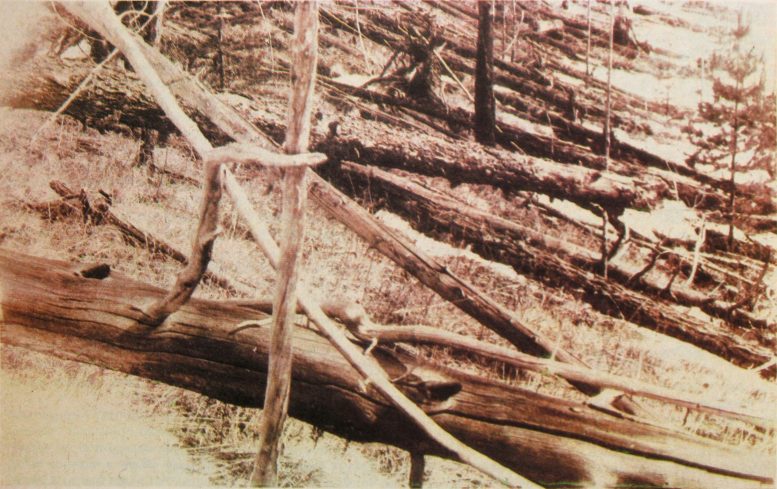
Fallen trees at Tunguska, Imperial Russia, seen in 1929, 15 km from the epicenter of the aerial blast site, caused by an explosion of a meteor in 1908. Credit: Photo N. A. Setrukov, 1928
ESA is in a unique position, with the cooperation and support of its Member States, to coordinate the data, information, and expertise needed to understand and respond to asteroid hazards in Europe and participate in humankind’s wider planetary defense efforts.
Over the last two decades, ESA has been performing detection and analysis of potentially hazardous NEOs. There are an estimated 5 million NEOs out there larger than 20 m – the threshold above which an impact could cause damage on the ground.
ESA ramps up asteroid activities
ESA’s Planetary Defence Office is carrying out a number of projects dedicated to improving our ability to detect, track, and mitigate potentially hazardous asteroids.
Launching later this year, ESA’s Hera mission is part of the world’s first test of asteroid deflection. Hera will perform a detailed post-impact survey of the asteroid Dimorphos following the impact of NASA’s DART mission in September 2022 and help turn the experiment into a well-understood and repeatable planetary defense technique. Members of the Hera team will take part in Asteroid Day celebrations later this week.
Back on Earth, ESA is developing a network of insect-inspired Flyeye telescopes that will use their uniquely wide field of view to automatically scan the entire sky every night on the hunt for new potentially hazardous asteroids.
Our future NEOMIR satellite will be located between Earth and the Sun. It will use infrared light to spot asteroids approaching our planet from regions of the sky that cannot be seen from the ground as they are obscured by the glare of our star.
Meanwhile, the Planetary Defence Office continues to keep a close eye on the sky today. ESA’s fireball camera in Cáceres, Spain, captured a stunning meteor during the night of May 18-19, 2024. It is thought to have been a small piece of a comet that flew over Spain and Portugal traveling at roughly 162,000 km/h before burning up over the Atlantic Ocean.
Just a couple of weeks later, on June 6, 2024, the Catalina Sky Survey in Arizona, USA, discovered a small asteroid 2-4 m (7-13 feet) in size that triggered an alert from ESA’s imminent impact monitoring system (Meerkat). That alert was not for an impact, but for a very close call. A few hours later, the object flew over the Catalina Sky Survey telescope that discovered it at a distance of just 1750 km (1100 miles), making it the second closest pass of a known, non-impacting asteroid ever.


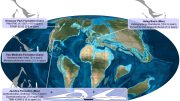


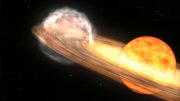
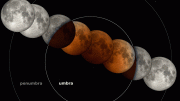

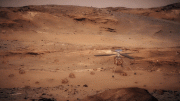
Be the first to comment on "Close Encounter: Two Large Asteroids Will Skim Past Earth Just 42 Hours Apart"